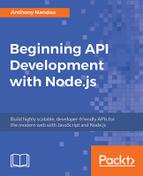Let's dive a little deeper into npm, by looking at some of the handy npm commands that you will often use:
- npm init: Initializes a Node.js project. This should be run at the root of your project and will create a respective package.json file. This file usually has the following parts (keys):
- name: Name of the project.
- version: Version of the project.
- description: Project description.
- main: The entry-point to your project, the main file.
- scripts: This will be a list of other keys whose values will be the scripts to be run, for example, test, dev-server. Therefore, to run this script, you will only need to type commands such as npm run dev-server, npm run test, and so on.
- dependencies: List of third-party packages and their versions used by the project. Whenever you do npm install <package-name> --save, this list is automatically updated.
- devDependencies: List of third-party packages that are not required for production, but only during development. This will usually include packages that help to automate your development workflow, for example, task runners like gulp.js. This list is automatically updated whenever you do npm install <package-name> --save-dev.
- npm install: This will install all the packages, as specified in the package.json file.
- npm install <package-name> <options>:
- With the --save option, installs the package and saves the details in the package.json file.
- With the --save-dev option, installs the package and saves the details in the package.json, under devDependencies.
- With the --global option, installs the package globally in the whole system, not only in the current system. Due to permissions, this might require running the command with administrator rights, for example, sudo npm install <package-name> --global.
- npm install <package-name>@<version>, installs a specific version of a package. Usually, if a version is not specified, the latest version will be installed.
- npm list: Lists the packages that have been installed for the project, reading from what is installed in node_modules.
- npm uninstall <package-name>: Removes an installed package.
- npm outdated: Lists installed packages that are outdated, that is, newer versions have been released.
